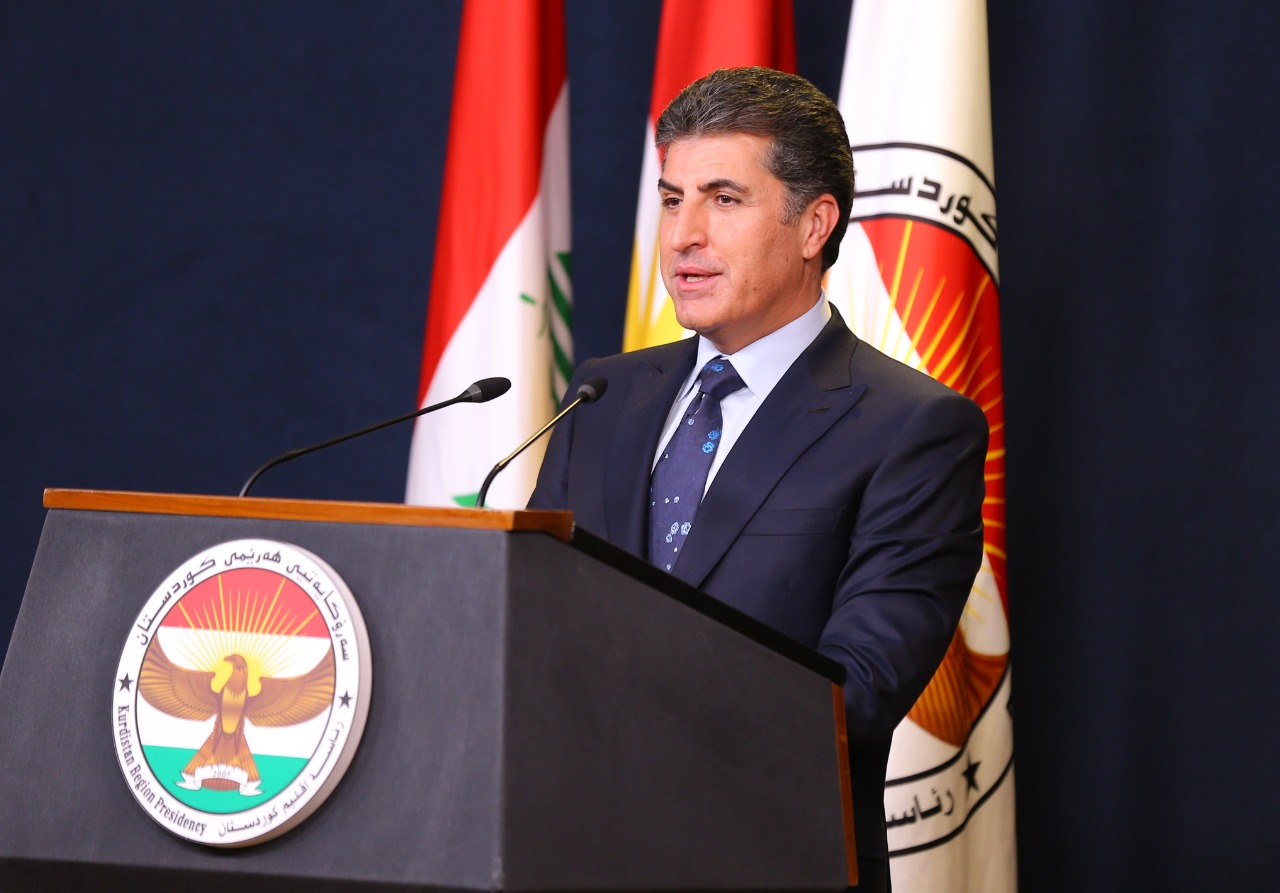
2020-11-16T14:11:53.000000Z
The three Presidencies of the Kurdistan Region met on Sunday in Erbil to discuss a contentious fiscal deficit bridge bill passed by the Iraqi parliament. The Speaker of the Parliament, the Office of the Kurdistan Regional Government (KRG) Prime Minister, and the Kurdistan Region President met at the Presidency of the Kurdistan Region to exchange views regarding the Federal Iraqi Parliament vote which raised concern in the Region. Following the meeting, a press conference was held for Kurdistan Region President Nechirvan Barzani.
The President started the press conference with an open speech stating:
“Today’s meeting with the three presidencies of the Kurdistan Region: The Parliament, the Prime Minister’s office, and the Presidency, aimed at discussing Fiscal Deficit Bridge Law by the Iraqi parliament. Passing this bill is of great concern for the Kurdistan Region and the reasons for this measure are clear. The language and tone of this bill are those of punishment, especially punishing the people and the employees of the Kurdistan Region. We view this with deep concern and see it as a dangerous development for Iraq. One important question for all Iraqi parties is this: do you consider the Kurdistan Region as a part of Iraq or no? The second question is whether Iraq considers Kurdistan Region civil servants as part of its employees or no? If we ask Baghdad these questions, the answer will be a definite “yes”, but the law they passed was against the principles of coexistence, balance of power, and cooperation, which were the most important principles on which Iraq was built back in 2003. The issues in Iraq will not be solved when one or some parties use the majority to pass a bill on the account of others. The problems of Iraq are more complicated than what they seem. I cannot make sense of how some Iraqi parties view this bill as a success. I consider it as the biggest failure in administering the country.”
The President went on stating: “By ignoring a major pillar in Iraq, the people of the Kurdistan Region, with all its existing components including Kurds, Turkmens, Christians, and others, this law violates the principles of coexistence that Iraq was built on. We are extremely disappointed at the Iraqi parties and we do not consider this as an achievement but a failure in governing this country called Iraq. If Iraqi parties give themselves the right to stop distributing salaries to the civil servants of the Kurdistan Region and use such rough language in drafting a parliamentary bill, then how can Kurds approve of partnership? How can they consider themselves part of this country with rights? We understand that we have both rights and responsibilities. The Kurdistan region is not evading its responsibilities and commitments towards Iraq. Questions are being asked whether the bill was passed due to the long-standing oil disputes between the Kurdistan Region and Baghdad? Let me answer this, this is far from the truth. The 9th Cabinet of the Kurdistan Regional Government, its Prime Minister, his deputy, and I have repeatedly stressed that we are ready to hold dialogue with Baghdad and reach an agreement over oil disputes. The Kurdistan Regional Government was under the impression that Iraq was going to send the Region’s agreed share of 320 billion Dinars until the end of this year, before striking a new deal next year. This sum of the budget is much less than what we should receive as our lawful entitlements, yet we agreed. The agreement was supposed to be implemented until both parties reach an agreement on the 2021 budget law through SOMO company on the share of the Region’s oil revenue, yet the Iraqi parliament’s vote has left us in shock. The KRG, and the Presidency, showed commitment to hold dialogue on solving oil disputes. The KRG Council of Ministers took the initiative of calling for a meeting of the Kurdistan Region Parliament possibly in the next few days to shed light on the facts and share them with peoples of the Kurdistan Region and Iraq. We will discuss how we agreed on this matter and will support our statements with numbers and documents.”
The president also added: “Today, we reiterate for all the Iraqi parties that we are ready for negotiations with Baghdad over oil and other issues. Oil is not the sole problem between us and Baghdad. We have serious other issues as well and without resolving them, Iraq will not be able to maintain stability. As the President of the Kurdistan Region, I call on the United Nation to interfere and play a role in resolving the disagreements between both sides. I believe The UN can help in resolving Erbil- Baghdad issues. The priority of the KRG now is to be able to provide salaries to its civil servants. We as the Presidency, KRG, and the Parliament would like to show gratitude and appreciation to the people of Kurdistan and the civil servants for their patience and understanding during these critical times. We assure them that our top priority will be finding a solution to the issue of their salaries, and I am sure we can reach an agreement with Baghdad on this issue.”
Later journalists who attended the press conference asked questions:
Regarding a question on the participation of the High Judicial Council in the meetings of the three presidencies of the Kurdistan Region, the President stated: “We don’t mind the participation of any party in the Region’s talks with Baghdad. A Kurdistan Region delegation will visit Baghdad to try and find a solution to this issue. Baghdad needs to show commitment and deliver the salaries of the Kurdistan Region employees. Today, In Iraq, two salaries of the past two months have been paid to Iraqi civil servants. If Iraq considers Kurdistan Region’s civil servants as part of its own working force, then it’s not fair that their salaries are not paid. The issue needs immediate action and Baghdad must send the budget share of the Kurdistan Region so that the salaries of the Region’s civil servants be paid.”
Regarding the agreement between the Kurdistan Regional Government and the Federal Iraqi Government in order to normalize the situation in Shingal (Sinjar), President Nechirvan Barzani said: “We have always strived to settle the issue with Baghdad through dialogue and mutual understanding. We thank Iraqi Prime Minister Mr. Mustafa Kadhimi’s initiative for the agreement on Shingal, and we are confident that such an agreement can become a good start to resolve disputes in other areas, including Kirkuk. The principle here is clear; do we all aim to preserve stability and security in Iraq? If yes, then such issues ought to be settled through dialogue. The Shingal Agreement is a result of productive dialogue between Baghdad and Erbil which we believed, and still believe, to be a proper agreement that serves all the components of Iraq. Therefore, we would like to reiterate that this agreement must be implemented and we hope to reach similar agreements regarding all other disputed territories.”
Regarding the options of the Kurdistan Region after the passing of the Fiscal Deficit Bridge Law by the Iraqi Parliament last week, President Nechirvan Barzani said: “We are communicating with H.E. Iraq’s President; however, that law was passed using a procedure that didn’t require approval from the Iraqi President. Our choice in this issue is to settle through dialogue and we will continue to follow the way of dialogue and strive to reach an agreement”.
Regarding the views that the Region’s contract with Rosneft and the 50-year-long agreement with Turkey are obstructing Erbil-Baghdad agreement, President Nechirvan Barzani explained: “neither our 50-year agreement with Turkey nor our contract with Rosneft are obstacles to resolve Kurdistan Region’s oil case with Baghdad. In the meetings with KRG delegations, Baghdad Officials told KRG representatives that this matter should remain as it is for now and that KRG may export its oil and Baghdad wouldn’t interfere in this stage. Therefore, this matter is not related in any way to our agreements with Rosneft or Turkey. Since the very first days, the KRG stated that it is willing to resolve this issue through dialogue.
Our agreement with Baghdad was to continue until the end of this year. For the 2021 budget, we would agree to discuss and settle all matters regarding oil, exports, and SOMO related matters. We didn’t make any unilateral move outside the agreement. However, what made the matter worse was passing that law in the Iraqi Parliament on allowing the Iraqi government to acquire loans to cover the deficit in public sector salaries, but the law was altered and turned into a budget law. Unfortunately, some of the blocs in the Iraqi Parliament, not all of them, exploited this opportunity and showed hostility to the people of Kurdistan Region; and this was a concern to us because if they are discussing receiving loans for Iraq, then Kurdistan Region is part of Iraq, Kurdistani civil servants are also part of the Iraqi civil servants. The question here is, why it is so harshly expressed in this law, that it must not provide any financial entitlements for the Kurdistan Region?
We seriously ask, why such injustice is committed against the people of the Kurdistan Region? This law is not against any political party in the Kurdistan Region, it is specifically against the people of the Kurdistan Region who are part of Iraq.”
The President of the Kurdistan Region added that: “Iraq and all its components, government and parliament, has a moral commitment vis-à-vis this issue. We are not talking about a foreign country; we are talking about citizens of this country who live here in Iraq. This law was a punishment for the people of Kurdistan. How would the people of Kurdistan think about this? How would Kurdistani youths react to this decision? They would ask: is this the Iraq that we intended to live in together? In 2003, we all contributed to the establishment of the new Iraq, and the dues that Kurdistan Region receives from the federal Iraqi government are rightful entitlements of the people of Kurdistan, not charity! We all know that we are a minority in Iraq; but was the new Iraq, in which we contributed to establishing, was built to treat the Kurdistan Region and all its components: Kurds, Turkmen, Christians, and others on a majority-minority basis?” No, we didn’t expect this. Once again, I call upon all political powers in Iraq to seriously consider this issue. We can find a solution to this law if we all believe in tolerance and peaceful coexistence.”
Regarding the KRG’s possibilities of borrowing money from international banks to pay its civil servants’ salaries, the President said that only the federal government is in charge of the country’s financial policies and that we as a Region in Iraq cannot borrow money from international banks, adding that unfortunately, Baghdad is not showing responsibility towards the people of the Kurdistan Region.
President Nechirvan Barzani said: “We are responsible for our civil servants and we will do whatever in our power to provide them with their salaries. One issue in the Region is that we have hired too many civil servants to work for the Region’s institutions. Regardless of the reason, this has been the situation and we have to find a solution to it. However, the question remains, as citizens of this country, is Iraq not responsible for the civil servants of the Kurdistan region? Baghdad must show responsibility in this matter”
Answering a question regarding the position of both Fatah Alliance and Saairun blocs in the Iraqi Parliament, the president brushed away the supposition that their position was against the Kurdistan Region and elaborated that “I don’t think they were against Kurds and I hope they are not because otherwise, it will not be in their and Iraq’s interest.”
Highlighting Kurdistan Region’s role in supporting the Iraqi Prime Minister, President Nechirvan Barzani said that: “the Prime Minister’s position in this matter is appreciated, the draft law sent by him was different from the one the parliament approved. We only advise the political blocs in the Iraqi Parliament who voted to pass the bill. On the other hand, I would like to thank the Kurdistani members of the Iraqi parliament who, regardless of political differences, unified their position and defended the Kurdistan Region.”
Regarding the next steps that the Kurdistan Region may take, the President said: “A delegation will visit Baghdad and we hope they will reach an agreement with the Federal Government regarding this matter.”
In response to an allegation by some Kurdistan Region MPs that if the Region sends oil to Baghdad the budget issue will be resolved, President Nechirvan Barzani stressed that the Kurdistan Region is willing to hand over the oil to Iraq and that the KRG had previously emphasized this in a written letter to the Iraqi Government. It’s never true that we don’t want to hand over oil to Baghdad. The President reiterated that the Kurdistan Region had an agreement with Baghdad according to which the latter delivers the monthly entitlements of the Region until the end of 2020 and for 2021 both sides make a new agreement on oil, budget, and the disputed territories and added that this agreement is available in writing.
As to the Kurdistan Region’s intention to reach an agreement with Baghdad, President Nechirvan Barzani said that: “It is the KRG’s responsibility to conduct negotiations with Iraq. Kurdistan region is willing to resolve all the disputes with Baghdad, including the disputed territories, Peshmerga, and all other issues. Our point of view is clear regarding all these issues; if we all believe to maintain security and stability in Iraq, all of these disputes need to be settled through dialogue. So far, Baghdad’s attitude towards the Kurdistan Region does not resemble a federal system, rather it resembles a centralized mindset that wants to control everything. It is time for Baghdad to reconsider its attitudes in this regard.
In 2003 we returned to Iraq voluntarily. Before that, we were not a member of the United Nations but our situation was different in every aspect. We were told that a new Iraq will be built. Then, Iraqi (opposition) parties came to us and told us that this will be a federal new Iraq, the Americans and the British also came to us. We agreed with the different Iraqi parties to jointly establish this new Iraq. Yet, 17 years after this, the people of Kurdistan are asking if there really is a federal system in the country. The answer is very clear. There isn’t. There is powerful centralism that wants to control everything.
The political parties in Iraq have reneged on their promises and statements they previously made. This is our problem in Iraq.
President Nechirvan Barzani reiterated that the Kurdistan Region abided by all its commitments to Iraq and did not breach any agreement made with Baghdad.
The President elaborated that: “Over the past years when the Iraqi government cut Kurdistan Region’s budget share, we were obliged to borrow money from companies in order to cover due payments. So, the whole issue is not about handing over oil to Iraq. I am saying it here frankly that we are willing to hand over all of the Region’s oil to Baghdad if they agree to send us 900 billion Iraqi Dinars every month. Yet, this needs negotiations and mutual understanding. Do you know how Baghdad talks to us? They say: “give us our rights, and for your rights trust in God”. Well, we do trust God, but it doesn’t work this way, this is not a proper attitude towards each other. Let us sit at the negotiation table and talk properly. So, yes, the Kurdistan Region is willing and has the intention to resolve these issues through talks.”
As to other allegations by some Kurdistan Region MPs suggesting that the KRG can pay its employees from non-oil incomes, such as customs and taxes; President Nechirvan Barzani said: “If they believe that salaries can be paid through this way, I would invite them to come forward and pay the salaries from these incomes. There is a huge difference between speaking from a distance and being a part of the process. People can make any statements from a distance, but when you come and see the reality of things, then you figure out the difference. Do you think there is any government in the world, any Prime Minister, any President or Vice-President who has the financial capability to provide salaries but refuses to do so? We distribute salaries according to the budget available to us, but I assure you that the KRG will do its best to resolve this issue”.
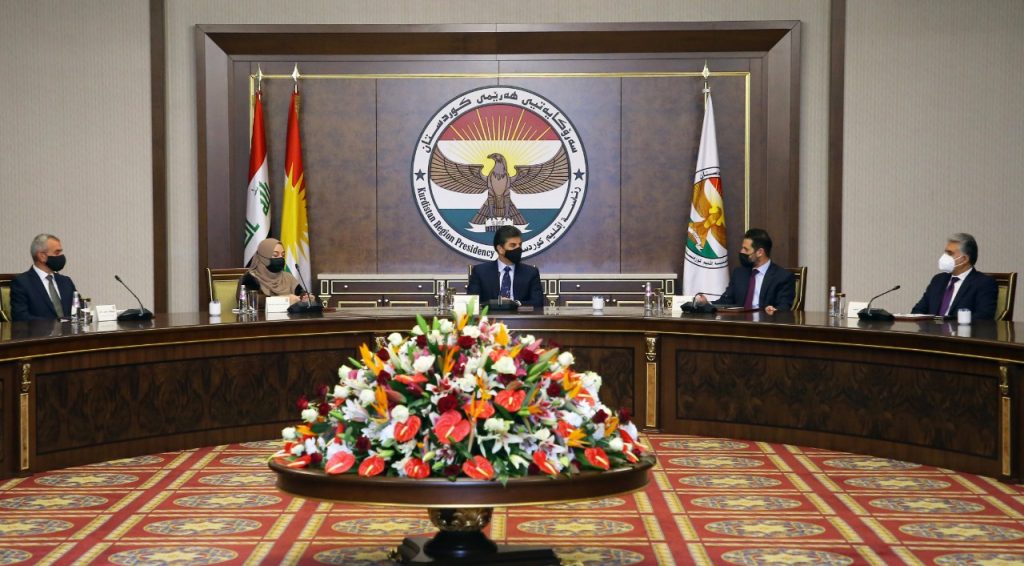
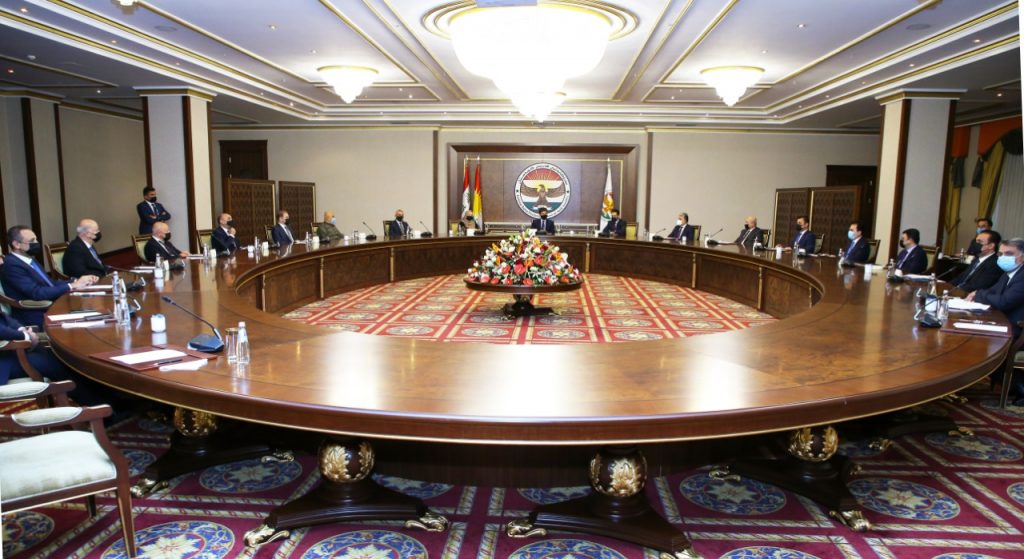
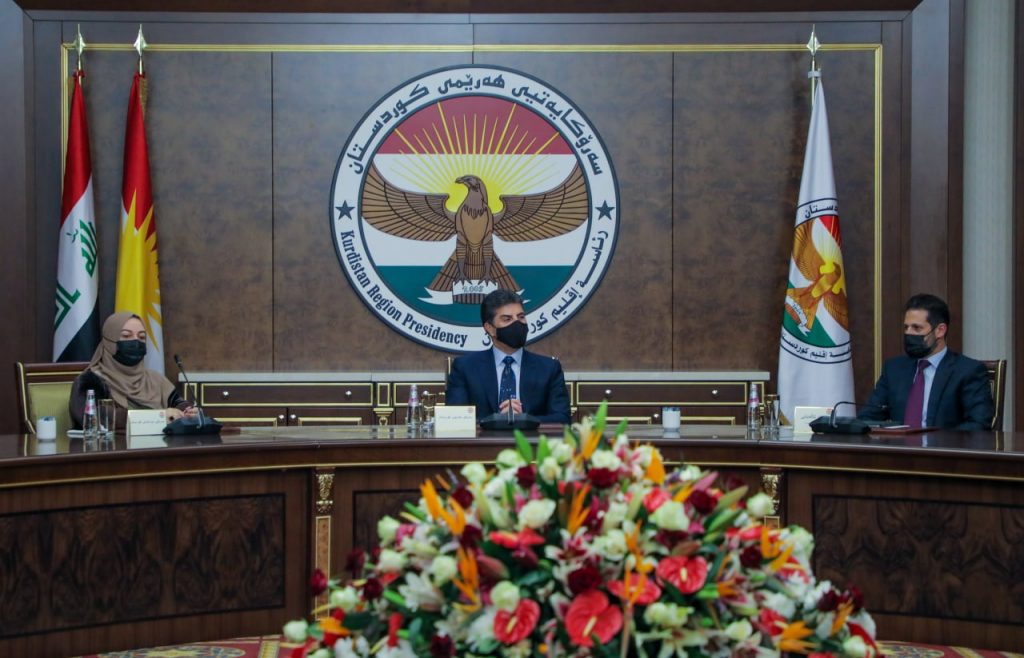
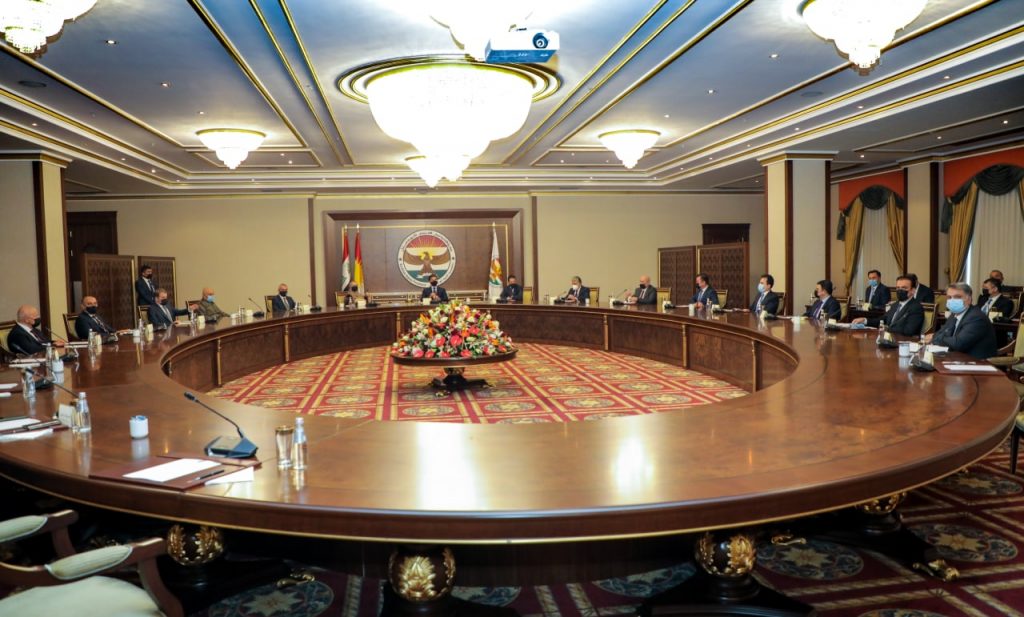
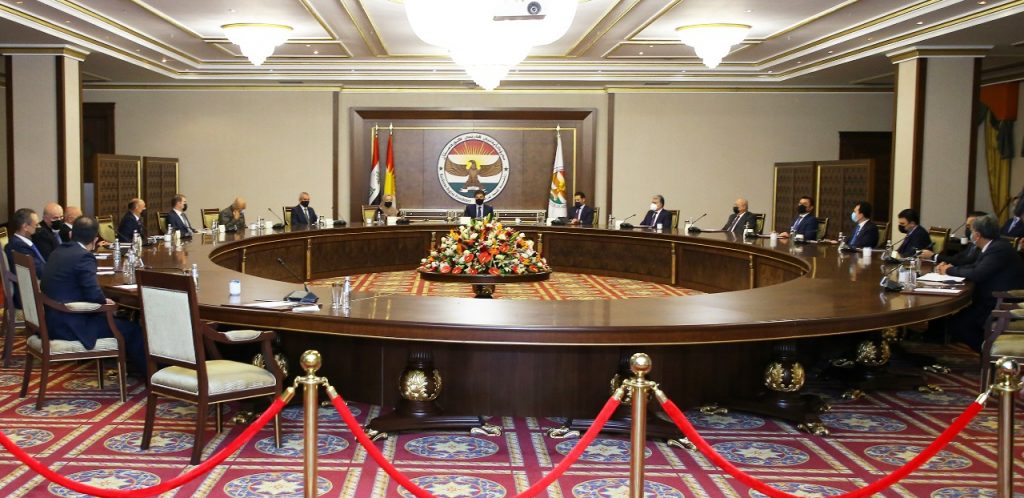

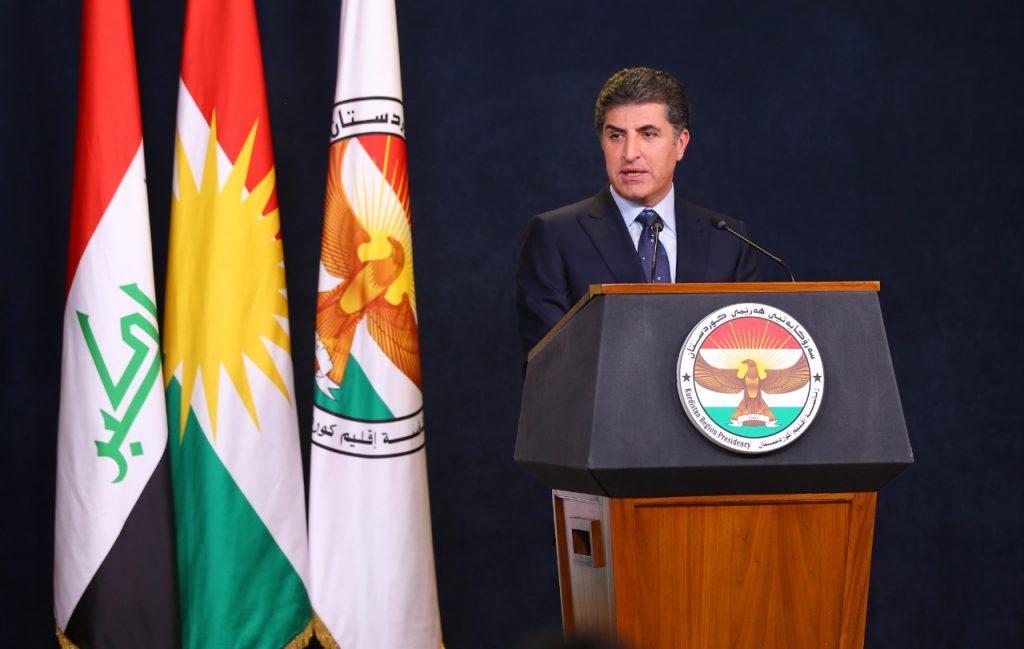
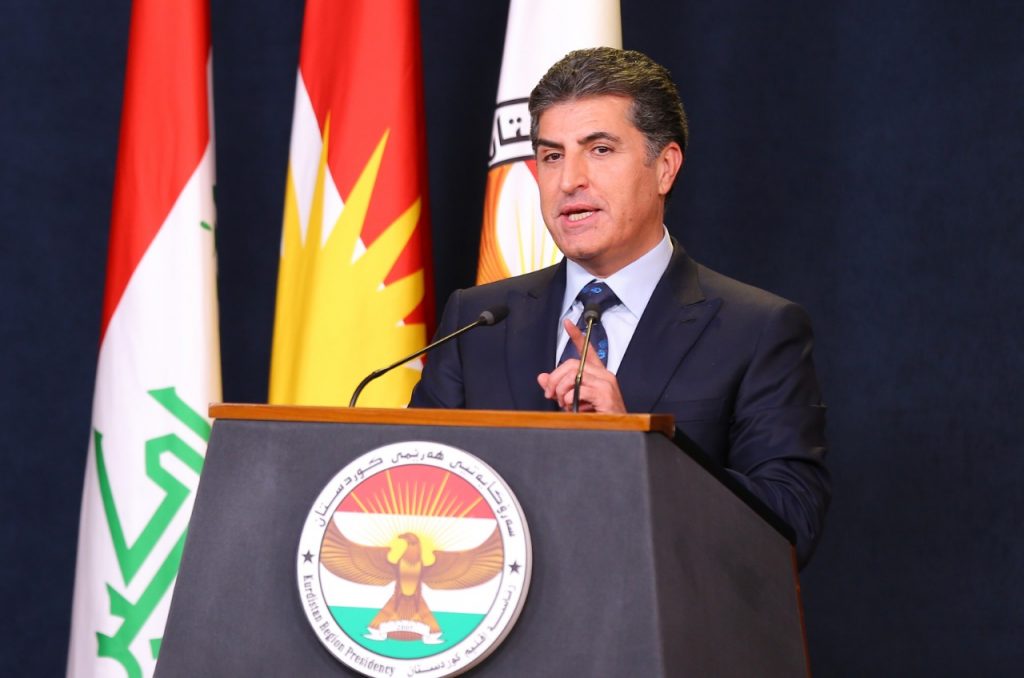
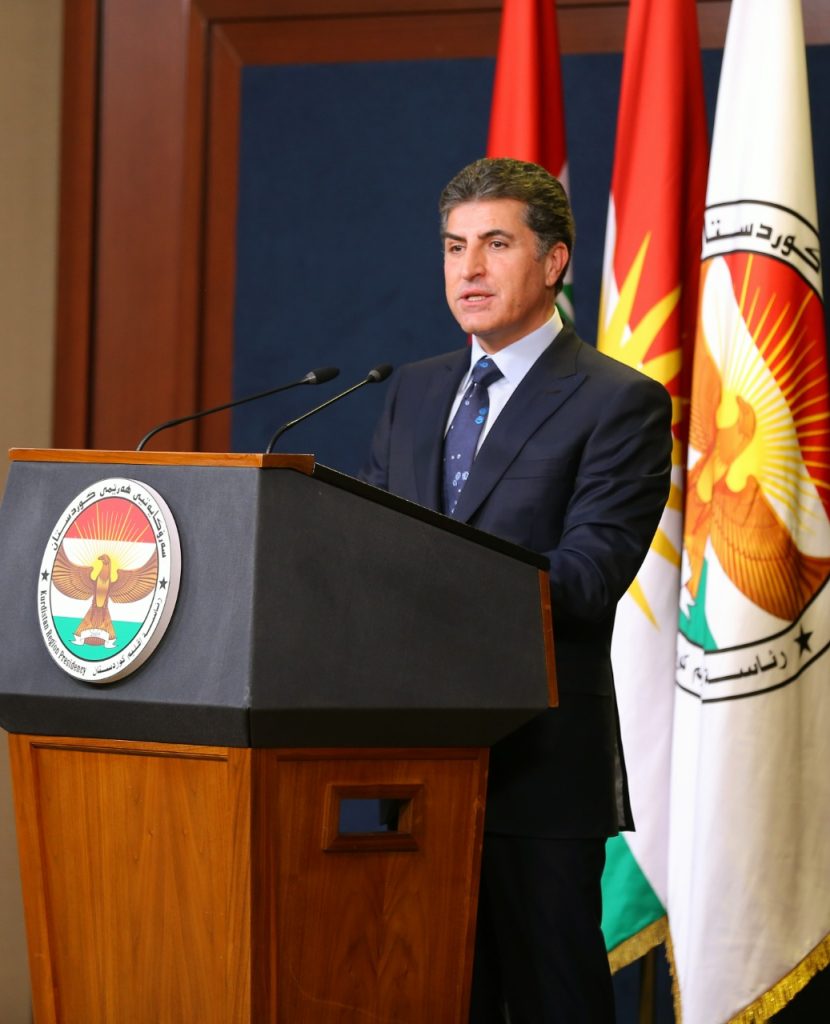
The President started the press conference with an open speech stating:
“Today’s meeting with the three presidencies of the Kurdistan Region: The Parliament, the Prime Minister’s office, and the Presidency, aimed at discussing Fiscal Deficit Bridge Law by the Iraqi parliament. Passing this bill is of great concern for the Kurdistan Region and the reasons for this measure are clear. The language and tone of this bill are those of punishment, especially punishing the people and the employees of the Kurdistan Region. We view this with deep concern and see it as a dangerous development for Iraq. One important question for all Iraqi parties is this: do you consider the Kurdistan Region as a part of Iraq or no? The second question is whether Iraq considers Kurdistan Region civil servants as part of its employees or no? If we ask Baghdad these questions, the answer will be a definite “yes”, but the law they passed was against the principles of coexistence, balance of power, and cooperation, which were the most important principles on which Iraq was built back in 2003. The issues in Iraq will not be solved when one or some parties use the majority to pass a bill on the account of others. The problems of Iraq are more complicated than what they seem. I cannot make sense of how some Iraqi parties view this bill as a success. I consider it as the biggest failure in administering the country.”
The President went on stating: “By ignoring a major pillar in Iraq, the people of the Kurdistan Region, with all its existing components including Kurds, Turkmens, Christians, and others, this law violates the principles of coexistence that Iraq was built on. We are extremely disappointed at the Iraqi parties and we do not consider this as an achievement but a failure in governing this country called Iraq. If Iraqi parties give themselves the right to stop distributing salaries to the civil servants of the Kurdistan Region and use such rough language in drafting a parliamentary bill, then how can Kurds approve of partnership? How can they consider themselves part of this country with rights? We understand that we have both rights and responsibilities. The Kurdistan region is not evading its responsibilities and commitments towards Iraq. Questions are being asked whether the bill was passed due to the long-standing oil disputes between the Kurdistan Region and Baghdad? Let me answer this, this is far from the truth. The 9th Cabinet of the Kurdistan Regional Government, its Prime Minister, his deputy, and I have repeatedly stressed that we are ready to hold dialogue with Baghdad and reach an agreement over oil disputes. The Kurdistan Regional Government was under the impression that Iraq was going to send the Region’s agreed share of 320 billion Dinars until the end of this year, before striking a new deal next year. This sum of the budget is much less than what we should receive as our lawful entitlements, yet we agreed. The agreement was supposed to be implemented until both parties reach an agreement on the 2021 budget law through SOMO company on the share of the Region’s oil revenue, yet the Iraqi parliament’s vote has left us in shock. The KRG, and the Presidency, showed commitment to hold dialogue on solving oil disputes. The KRG Council of Ministers took the initiative of calling for a meeting of the Kurdistan Region Parliament possibly in the next few days to shed light on the facts and share them with peoples of the Kurdistan Region and Iraq. We will discuss how we agreed on this matter and will support our statements with numbers and documents.”
The president also added: “Today, we reiterate for all the Iraqi parties that we are ready for negotiations with Baghdad over oil and other issues. Oil is not the sole problem between us and Baghdad. We have serious other issues as well and without resolving them, Iraq will not be able to maintain stability. As the President of the Kurdistan Region, I call on the United Nation to interfere and play a role in resolving the disagreements between both sides. I believe The UN can help in resolving Erbil- Baghdad issues. The priority of the KRG now is to be able to provide salaries to its civil servants. We as the Presidency, KRG, and the Parliament would like to show gratitude and appreciation to the people of Kurdistan and the civil servants for their patience and understanding during these critical times. We assure them that our top priority will be finding a solution to the issue of their salaries, and I am sure we can reach an agreement with Baghdad on this issue.”
Later journalists who attended the press conference asked questions:
Regarding a question on the participation of the High Judicial Council in the meetings of the three presidencies of the Kurdistan Region, the President stated: “We don’t mind the participation of any party in the Region’s talks with Baghdad. A Kurdistan Region delegation will visit Baghdad to try and find a solution to this issue. Baghdad needs to show commitment and deliver the salaries of the Kurdistan Region employees. Today, In Iraq, two salaries of the past two months have been paid to Iraqi civil servants. If Iraq considers Kurdistan Region’s civil servants as part of its own working force, then it’s not fair that their salaries are not paid. The issue needs immediate action and Baghdad must send the budget share of the Kurdistan Region so that the salaries of the Region’s civil servants be paid.”
Regarding the agreement between the Kurdistan Regional Government and the Federal Iraqi Government in order to normalize the situation in Shingal (Sinjar), President Nechirvan Barzani said: “We have always strived to settle the issue with Baghdad through dialogue and mutual understanding. We thank Iraqi Prime Minister Mr. Mustafa Kadhimi’s initiative for the agreement on Shingal, and we are confident that such an agreement can become a good start to resolve disputes in other areas, including Kirkuk. The principle here is clear; do we all aim to preserve stability and security in Iraq? If yes, then such issues ought to be settled through dialogue. The Shingal Agreement is a result of productive dialogue between Baghdad and Erbil which we believed, and still believe, to be a proper agreement that serves all the components of Iraq. Therefore, we would like to reiterate that this agreement must be implemented and we hope to reach similar agreements regarding all other disputed territories.”
Regarding the options of the Kurdistan Region after the passing of the Fiscal Deficit Bridge Law by the Iraqi Parliament last week, President Nechirvan Barzani said: “We are communicating with H.E. Iraq’s President; however, that law was passed using a procedure that didn’t require approval from the Iraqi President. Our choice in this issue is to settle through dialogue and we will continue to follow the way of dialogue and strive to reach an agreement”.
Regarding the views that the Region’s contract with Rosneft and the 50-year-long agreement with Turkey are obstructing Erbil-Baghdad agreement, President Nechirvan Barzani explained: “neither our 50-year agreement with Turkey nor our contract with Rosneft are obstacles to resolve Kurdistan Region’s oil case with Baghdad. In the meetings with KRG delegations, Baghdad Officials told KRG representatives that this matter should remain as it is for now and that KRG may export its oil and Baghdad wouldn’t interfere in this stage. Therefore, this matter is not related in any way to our agreements with Rosneft or Turkey. Since the very first days, the KRG stated that it is willing to resolve this issue through dialogue.
Our agreement with Baghdad was to continue until the end of this year. For the 2021 budget, we would agree to discuss and settle all matters regarding oil, exports, and SOMO related matters. We didn’t make any unilateral move outside the agreement. However, what made the matter worse was passing that law in the Iraqi Parliament on allowing the Iraqi government to acquire loans to cover the deficit in public sector salaries, but the law was altered and turned into a budget law. Unfortunately, some of the blocs in the Iraqi Parliament, not all of them, exploited this opportunity and showed hostility to the people of Kurdistan Region; and this was a concern to us because if they are discussing receiving loans for Iraq, then Kurdistan Region is part of Iraq, Kurdistani civil servants are also part of the Iraqi civil servants. The question here is, why it is so harshly expressed in this law, that it must not provide any financial entitlements for the Kurdistan Region?
We seriously ask, why such injustice is committed against the people of the Kurdistan Region? This law is not against any political party in the Kurdistan Region, it is specifically against the people of the Kurdistan Region who are part of Iraq.”
The President of the Kurdistan Region added that: “Iraq and all its components, government and parliament, has a moral commitment vis-à-vis this issue. We are not talking about a foreign country; we are talking about citizens of this country who live here in Iraq. This law was a punishment for the people of Kurdistan. How would the people of Kurdistan think about this? How would Kurdistani youths react to this decision? They would ask: is this the Iraq that we intended to live in together? In 2003, we all contributed to the establishment of the new Iraq, and the dues that Kurdistan Region receives from the federal Iraqi government are rightful entitlements of the people of Kurdistan, not charity! We all know that we are a minority in Iraq; but was the new Iraq, in which we contributed to establishing, was built to treat the Kurdistan Region and all its components: Kurds, Turkmen, Christians, and others on a majority-minority basis?” No, we didn’t expect this. Once again, I call upon all political powers in Iraq to seriously consider this issue. We can find a solution to this law if we all believe in tolerance and peaceful coexistence.”
Regarding the KRG’s possibilities of borrowing money from international banks to pay its civil servants’ salaries, the President said that only the federal government is in charge of the country’s financial policies and that we as a Region in Iraq cannot borrow money from international banks, adding that unfortunately, Baghdad is not showing responsibility towards the people of the Kurdistan Region.
President Nechirvan Barzani said: “We are responsible for our civil servants and we will do whatever in our power to provide them with their salaries. One issue in the Region is that we have hired too many civil servants to work for the Region’s institutions. Regardless of the reason, this has been the situation and we have to find a solution to it. However, the question remains, as citizens of this country, is Iraq not responsible for the civil servants of the Kurdistan region? Baghdad must show responsibility in this matter”
Answering a question regarding the position of both Fatah Alliance and Saairun blocs in the Iraqi Parliament, the president brushed away the supposition that their position was against the Kurdistan Region and elaborated that “I don’t think they were against Kurds and I hope they are not because otherwise, it will not be in their and Iraq’s interest.”
Highlighting Kurdistan Region’s role in supporting the Iraqi Prime Minister, President Nechirvan Barzani said that: “the Prime Minister’s position in this matter is appreciated, the draft law sent by him was different from the one the parliament approved. We only advise the political blocs in the Iraqi Parliament who voted to pass the bill. On the other hand, I would like to thank the Kurdistani members of the Iraqi parliament who, regardless of political differences, unified their position and defended the Kurdistan Region.”
Regarding the next steps that the Kurdistan Region may take, the President said: “A delegation will visit Baghdad and we hope they will reach an agreement with the Federal Government regarding this matter.”
In response to an allegation by some Kurdistan Region MPs that if the Region sends oil to Baghdad the budget issue will be resolved, President Nechirvan Barzani stressed that the Kurdistan Region is willing to hand over the oil to Iraq and that the KRG had previously emphasized this in a written letter to the Iraqi Government. It’s never true that we don’t want to hand over oil to Baghdad. The President reiterated that the Kurdistan Region had an agreement with Baghdad according to which the latter delivers the monthly entitlements of the Region until the end of 2020 and for 2021 both sides make a new agreement on oil, budget, and the disputed territories and added that this agreement is available in writing.
As to the Kurdistan Region’s intention to reach an agreement with Baghdad, President Nechirvan Barzani said that: “It is the KRG’s responsibility to conduct negotiations with Iraq. Kurdistan region is willing to resolve all the disputes with Baghdad, including the disputed territories, Peshmerga, and all other issues. Our point of view is clear regarding all these issues; if we all believe to maintain security and stability in Iraq, all of these disputes need to be settled through dialogue. So far, Baghdad’s attitude towards the Kurdistan Region does not resemble a federal system, rather it resembles a centralized mindset that wants to control everything. It is time for Baghdad to reconsider its attitudes in this regard.
In 2003 we returned to Iraq voluntarily. Before that, we were not a member of the United Nations but our situation was different in every aspect. We were told that a new Iraq will be built. Then, Iraqi (opposition) parties came to us and told us that this will be a federal new Iraq, the Americans and the British also came to us. We agreed with the different Iraqi parties to jointly establish this new Iraq. Yet, 17 years after this, the people of Kurdistan are asking if there really is a federal system in the country. The answer is very clear. There isn’t. There is powerful centralism that wants to control everything.
The political parties in Iraq have reneged on their promises and statements they previously made. This is our problem in Iraq.
President Nechirvan Barzani reiterated that the Kurdistan Region abided by all its commitments to Iraq and did not breach any agreement made with Baghdad.
The President elaborated that: “Over the past years when the Iraqi government cut Kurdistan Region’s budget share, we were obliged to borrow money from companies in order to cover due payments. So, the whole issue is not about handing over oil to Iraq. I am saying it here frankly that we are willing to hand over all of the Region’s oil to Baghdad if they agree to send us 900 billion Iraqi Dinars every month. Yet, this needs negotiations and mutual understanding. Do you know how Baghdad talks to us? They say: “give us our rights, and for your rights trust in God”. Well, we do trust God, but it doesn’t work this way, this is not a proper attitude towards each other. Let us sit at the negotiation table and talk properly. So, yes, the Kurdistan Region is willing and has the intention to resolve these issues through talks.”
As to other allegations by some Kurdistan Region MPs suggesting that the KRG can pay its employees from non-oil incomes, such as customs and taxes; President Nechirvan Barzani said: “If they believe that salaries can be paid through this way, I would invite them to come forward and pay the salaries from these incomes. There is a huge difference between speaking from a distance and being a part of the process. People can make any statements from a distance, but when you come and see the reality of things, then you figure out the difference. Do you think there is any government in the world, any Prime Minister, any President or Vice-President who has the financial capability to provide salaries but refuses to do so? We distribute salaries according to the budget available to us, but I assure you that the KRG will do its best to resolve this issue”.














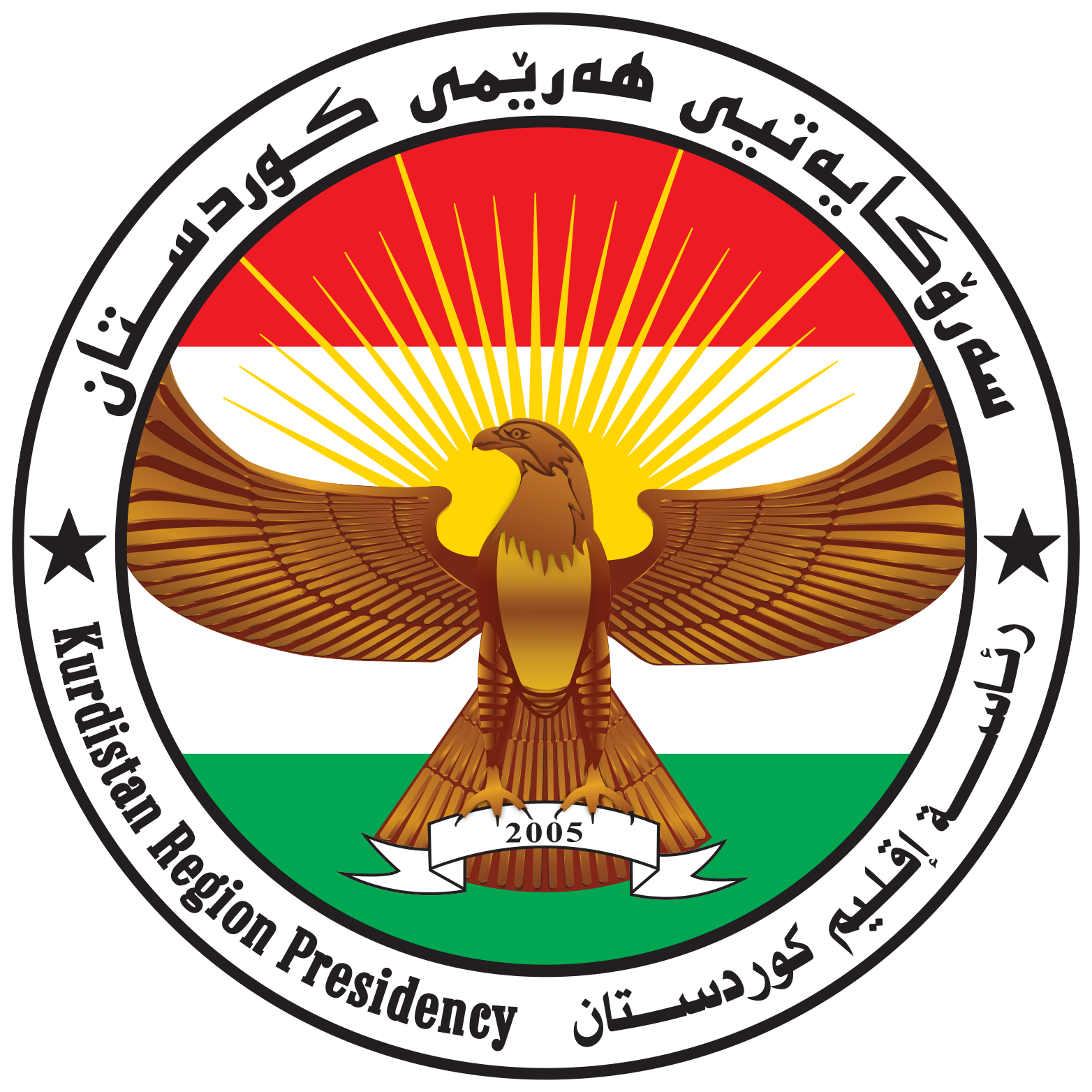

 پەرلەمانی کوردستان
پەرلەمانی کوردستان
